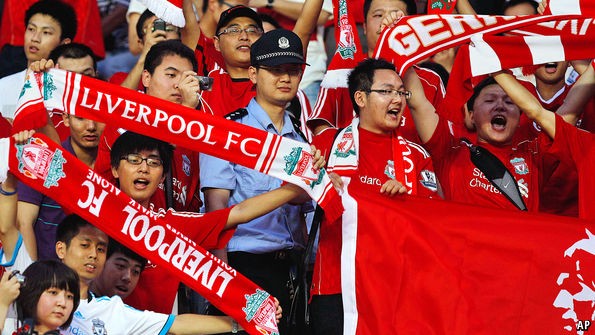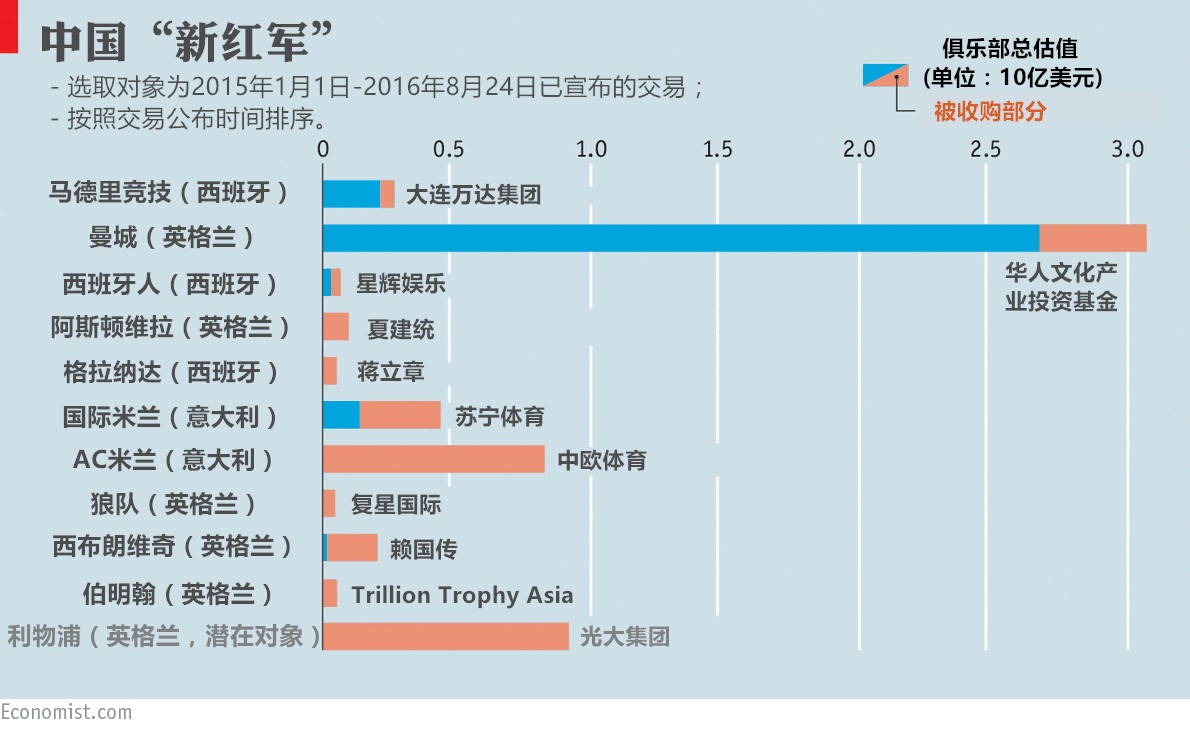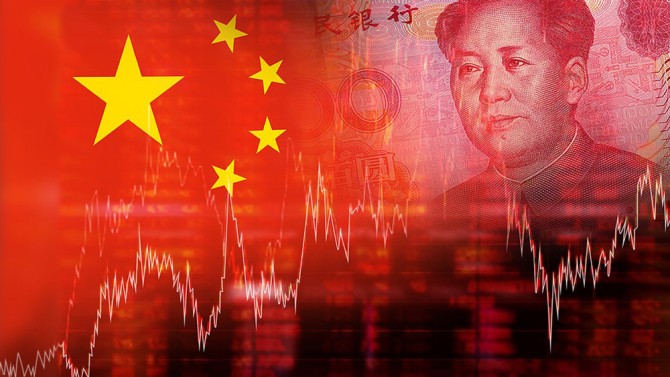注:本文译自英国著名新闻杂志周刊《经济学人》。《经济学人》(The Economist)是一份以报导新闻与国际关系为主的英文刊物,每周出版一期,采用杂志专用的光面纸印刷,由伦敦的经济学人报纸有限公司出版。虽然它的发行方式更像是周刊,但是《经济学人》将自己定位为报纸,因此,它每一期除了提供分析与意见外,还报道整周发生的所有重要政经新闻。《经济学人》从1843年9月由詹姆士-威尔逊创办,该刊以受过高等教育的读者为目标受众,读者群中包含众多拥有巨大影响力的决策者和企业家。

红军会被红色资本收购吗?近来媒体报道,由中国政府支持的金融公司光大集团十分渴望收购利物浦俱乐部,这一体育界最负盛名的品牌之一。如果这笔交易最终达成,那么它将是近期一系列中国资本收购欧洲足球的巅峰之作。甚至有些人认为这样的举动会重新勾勒体育版图。阿森纳的教练温格曾经说过,他认为中国有经济能力把整个欧洲联赛都搬到中国。
据国际经济咨询公司荣鼎集团统计,从去年一月开始到现在,中国资本在收购国外俱乐部方面的花费已经达到了惊人的20亿美金。而这个数字,还在持续增长。目前为止最大的一笔交易来自于收购AC米兰,一家中国财团为此花费了8.2亿美金,此消息在7月5日官方宣布。中国资本也同样向球员个人发起了冲击,就如同倾泻的瀑布一般。最近的一笔令人瞠目结舌的交易就是上港集团在6月花费6100万美金签下了巴西球员吉瓦尼尔多-维埃拉-德-索萨,就是我们熟知的胡尔克。

(图)在2015年1月1日-2016年8月24日官宣的中国财团收购,感谢@尼加拉瓜喵 友情帮忙PS图片
众所周知,中国主席习近平是足球运动的一生粉。在2025年之前,他想让中国国内的体育产业价值达到8500亿美金。中国在2030年之前举办世界杯,并在这之后尽快赢得世界杯也是他的目标。政府官员很快就开始了行动,他们公布了一本名为“中国足球改革与发展计划”的白皮书,其中共包含50个点。此外,他们还向投资足球的公司提供税收减免等其他优惠。
一呼百应,从商业精英到不知名的财团,中国投资者纷纷开始涉足足球产业。在习近平主席开展让人感到恐惧的反腐活动时,一些商人留意到了投资足球这项政府公开支持的产业所能带来的利益。就拿狼队的新老板,复星国际的董事长郭广昌来当个例子吧。去年12月他曾短暂的遭到了警方扣留,几天之后被无罪释放。此外,外国足球俱乐部也为投资者们提供了一个国家认可的把资产转移出中国的方法,在人民币汇率下降的时候让他们避免损失。
许多购买国外俱乐部的公司也在国内足球方面投资巨大。通过观察欧洲球队如何培养青年才俊而积累的知识最终会提高中国球场上球员的技术水平,那里的踢球情况一直以来都很不理想。来自考文垂大学商学院的西蒙-查德威克表示,中国财团这种收购并非对欧洲足球的盲目崇拜,而是十分具有战略意义的。
了解利物浦的内部人员都不看好马上达成直接交易,但是距离安菲尔德50公里外发生的事情可能会动摇利物浦老板的决心。曼城,13%的股份已经被中国的华人文化产业投资基金收购(一家在中国媒体界有很强存在感的风投公司),这家来自曼彻斯特的俱乐部已经准备好了要在一个巨大的、无法阻止的足球市场上来提升自己。近期,曼城已经同意会在中国建立一家卫星俱乐部。

(图)中国主席习近平、英国首相卡梅伦和曼城前锋阿圭罗的世纪自拍
中国的分析师认为中国财团这一系列收购是一个泡沫。来自于一个名为中国体育知情人的工业博客的马克-德雷尔说道:“与在奥林匹克运动会的巨大成功相比,通过疯狂烧钱很难让中国足球的成功达到相同的程度。”与假球泛滥、操纵比赛成风的时期相比,现在足球腐败情况并没有以前那么严重了。但是,香港著名的马会博彩公司(承办多种体育竞彩)仍然对中国的比赛持怀疑态度,目前并没有开关于中国足球比赛的盘口。
政府支持可能带来的另一个问题与之前的工业政策有点相似,一方面会引起投资过剩,另一方面会引起其他工业的长期弱势。举个例子,一家名为贝恩的咨询公司在最近的研究中表示,尽管中国计划投资1000亿美金来购买半导体公司和相关技术,但是中国想成为全球芯片制造业超级大国的可能性很小。一份带有类似结论的关于中国在足球方面野心的相关报道也会在近期出炉。

PS:本文原文的英文用词十分考究和地道,小编认为能给大家带来非常多的帮助。现在将原文附上,希望大家一起学习,一起进步。
WILL the Reds go red? Everbright, a Chinese state-backed financial conglomerate, is reportedly keen to buy Liverpool Football Club, one of the sport’s most celebrated names. If it were to happen, it would be the biggest in a series of recent investments made by mainland firms in European football (see chart). Some think such moves will redraw the sporting map. Arsène Wenger, manager of Arsenal, a London club, has said that China has the financial wherewithal to “move a whole league of Europe to China”.
The tally of Chinese investment in foreign football clubs since January of last year now stands at $2 billion, according to Rhodium Group, a consulting firm. The sums keep growing. The biggest deal yet was the takeover of AC Milan for $820m by a mainland consortium, announced on July 5th. Chinese money has also cascaded towards individual footballers, who often join the world’s best paid. The latest jaw-dropping deal was Shanghai SIPG’s signing of Givanildo Vieira de Sousa, a Brazilian star known as Hulk, in June for $61m.
China’s president, Xi Jinping, a lifelong football fan, approves. He wants to build a domestic sports industry worth $850 billion by 2025. His other goals are for China to host the World Cup by 2030 and win it soon after. The bureaucracy has swung into action, issuing 50-point policy plans and offering tax breaks and other inducements to firms investing in the game.
Many have responded, with Chinese investors in football ranging from the business elite to the relatively unknown. Some businessmen may be mindful of the benefits of being seen to invest in the state’s declared priorities during Mr Xi’s feared anti-corruption campaign. The new owner of Wolverhampton Wanderers, Guo Guangchang, the boss of Fosun Group, for instance, was briefly detained by police last December before being released with no charges a few days later. Foreign football clubs also offer investors a state-sanctioned way to move money out of China, and a hedge against the falling yuan.
Many of those buying clubs abroad are also spending big on football back home. The knowledge gleaned from inspecting the way in which European clubs develop talent should eventually boost skills on pitches in China, where playing standards have long been poor. The investment is not a case of blind adoration for European football, argues Simon Chadwick of Coventry University Business School, but is rather quite strategic.
Insiders who know Liverpool FC are playing down the likelihood of an imminent deal, but the club’s owners may be swayed by events 50km away from Anfield, its home. Manchester City, of which 13% is owned by a consortium led by China Media Capital (CMC), a venture-capital firm with a strong presence in Chinese media, is well placed to lift its profile in a vast, untapped football market. Manchester City has recently agreed a deal to set up a satellite club in China.
Analysts based in China tend to think that the string of purchases represents a bubble. The nation is likely to have less success in spending its way to the top in football than it has had in the Olympics, says Mark Dreyer of China Sports Insider, an industry blog. Corruption now is not as bad as in the old days of “black ball” scandals, when many matches were fixed. Still, the Hong Kong Jockey Club, which hosts betting on a range of sports, remains suspicious and does not allow bets on Chinese football matches.
And the problem with state backing is that it could easily lead to the sort of industrial policies that have led to overinvestment and underperformance in several other Chinese industries. The chances of China becoming a global chip-making superpower, for example, are slim, even though it plans to spend over $100 billion buying semiconductor firms and technologies, said Bain & Company, a consultancy, in a recent study. A report drawing similar conclusions about China’s ambitions in football could soon be on its way.
也许您还喜欢:世界杯直播 亚洲杯直播 欧洲杯直播 足球直播
上一篇: 人民日报:全力以赴能赢得掌声
下一篇: 懂球帝本周国际赛事MVP:穆勒
百度搜索:《经济学人》谈中国足球:红色资本,席卷全球
360搜索:《经济学人》谈中国足球:红色资本,席卷全球
搜狗搜索:《经济学人》谈中国足球:红色资本,席卷全球
2018nba选秀特雷杨,特雷杨那届选秀顺位2024/12/18 17:59:45
cctv5nba总决赛录像,央视转播nba总决赛第五场2024/12/18 17:59:45
nba选秀视频2019,NBA选秀视频20232024/12/18 17:59:45
最强nba扣篮球星推荐,最强nba扣篮和上篮2024/12/18 17:59:45
2011nba总决赛詹姆斯,11年总决赛詹姆斯8分2024/12/18 17:59:45
nba2kol突破紫色球星,nba2kol1紫卡球星突破2024/12/18 17:59:45
nba2konline06科比预测,nba2kol06科比测评2024/12/18 16:20:22
nba球星对威少的评价,nba球星对威少的评价视频2024/12/18 16:20:22
 广东电视体育台直播世界杯,广东体育台体育世界
广东电视体育台直播世界杯,广东体育台体育世界 2019cba选秀结果名单,2019cba最佳阵容
2019cba选秀结果名单,2019cba最佳阵容 cba26轮广东对山东,cba 广东对山东
cba26轮广东对山东,cba 广东对山东 恒大足球亚冠赛事直播回放,恒大亚冠赛程2020直播
恒大足球亚冠赛事直播回放,恒大亚冠赛程2020直播 法甲圣埃蒂安vs巴黎圣日耳曼比分,法甲圣埃蒂安主帅
法甲圣埃蒂安vs巴黎圣日耳曼比分,法甲圣埃蒂安主帅 中超直播恒大vs大连人录像,中超恒大对大连一方现场直播
中超直播恒大vs大连人录像,中超恒大对大连一方现场直播 cba儿童票身高有要求吗,cba门票怎么买学生票
cba儿童票身高有要求吗,cba门票怎么买学生票 英超半程冠军最后没夺冠,英超历年半程积分榜
英超半程冠军最后没夺冠,英超历年半程积分榜 英超有哪些宝贝,英超有哪些宝贝名字
英超有哪些宝贝,英超有哪些宝贝名字